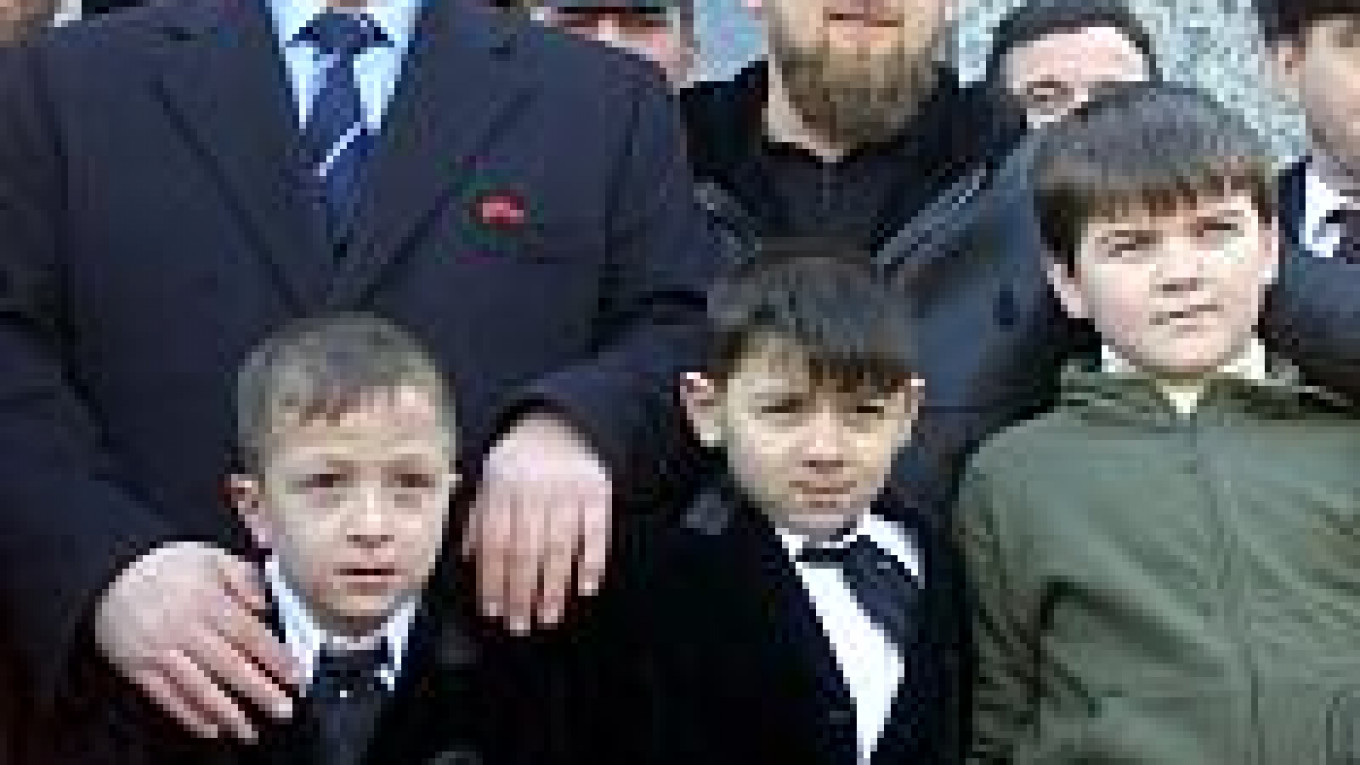Less than a year after pro-Moscow Chechen President Akhmad Kadyrov died in a bomb attack claimed by Chechen rebels, a personality cult is quickly growing around him that is giving him a myth-like stature among the war-weary public.
"All of Kadyrov's strengths have become clearer now that he can be compared with the new president, Alu Alkhanov," Grozny taxi driver Ruslan Dudayev said, summing up a widespread sentiment here.
"Kadyrov could get a lot more from Moscow when he wanted to. That's why he was killed," he said. "Alkhanov is doing what the Kremlin tells him to do."
A former mufti who fought against federal troops in the 1994-96 Chechen conflict, the charismatic Kadyrov was handpicked by Moscow in 2000 to be the loyal leader who would keep Chechnya from breaking away from Russia.
While accepting much-needed support from federal troops, Kadyrov persistently replaced officials picked by Moscow with people of his own in his administration. He pressed Moscow to accept a Chechen Constitution giving the republic more sovereignty than any other Russian region dared ask for, and actively sought federal funds in exchange for his administration's loyalty. Corruption flourished under his watch as a new Chechen political and economic elite formed.
Tamara Uzunkhadjiyeva, a history professor at the Grozny Oil Institute, said the efforts to create a larger-than-life legacy for Kadyrov closely resemble the creation of Soviet-era myths about Chechens participating in the 1917 Revolution. "This is just a way to ideologically indoctrinate young people," she said. "We live during a time when new Chechen heroes are being created."
Kadyrov would have been pleased to support a cult of personality around him but could not establish one in his lifetime because of his criminal retinue, some in Chechnya say. "His image was always damaged by the people around him, and most of all by his son Ramzan," said Anzor, a former Chechen rebel who spoke on condition his last name not be used.
Ramzan Kadyrov, the powerful Chechen deputy prime minister, heads a widely feared security force that has been accused by human rights groups of torturing civilians and running an unofficial prison in the family's home village of Tsentoroi.
It was in Tsentoroi that Ramzan Kadyrov, Alkhanov and members of the Chechen government and State Council gathered for the opening of the new Kadyrov school and museum last month. On display in the museum are photographs of Kadyrov standing next to President Vladimir Putin, walking down a red carpet at his inauguration, and taking the oath of office on the Russian Constitution.
The 770-student school, which houses the museum, has a bronze relief of the late president on its facade and boasts high ceilings, carpeting, wooden-panel walls and computers for students to use when it opens for classes in the fall.
This is "one of the best schools in Russia," Alkhanov announced proudly at the opening.
The cost of the school and sources of its funding have not been disclosed. Some here speculate that it cost about $20 million.
Putin set off the chain of events and projects that are contributing to Kadyrov's personality cult by signing a decree just a day after the May 9 assassination that ordered his legacy be immortalized. Nudging the process along are Kadyrov's son Ramzan and his widow, Aimani, who runs the Kadyrov memorial fund.
The main street in Grozny, Leninsky Prospekt, will soon officially be renamed after Kadyrov, while a street of new buildings in southwestern Moscow has already been named after him. A monument to Kadyrov will be erected in Grozny by August, according to the Chechen presidential press service. Kadyrov's portraits are routinely glued to the windshields of cars in Chechnya, and a huge blue sign greeting everyone entering Grozny from the west reads in big black letters: "True to Akhmad-Hadji's Teachings."
The efforts to build Kadyrov's legacy appear to be paying off, and less than a year after his death the public broadly perceives him as having been a strong and good leader. "He was indeed. Even under [rebel president Aslan] Maskhadov, Kadyrov was his own man," said Anzor, the former rebel. "If he could have convinced Maskhadov to squash the Wahhabis, we would be living without war today."
As the spiritual leader of Sunni Muslims in Maskhadov's de facto independent Chechnya in the late 1990s, Kadyrov fiercely resisted the spread of religious radicalism among Chechens and even attempted to disarm fundamentalists in Gudermes, the republic's second-largest city and his home at the time.
Still, not everyone is enthusiastic about Kadyrov's ever-increasing popularity. "Years ago, Kadyrov preached that Muslims should not worship human beings or animals when he protested the nomination of a wolf as the national emblem of an independent Chechnya," said Magomed Matayev, a traffic police officer. "Now, he is becoming a deity himself. If this goes any further, I would not be surprised if they build a mausoleum for him and bring in people to worship him."
A Message from The Moscow Times:
Dear readers,
We are facing unprecedented challenges. Russia's Prosecutor General's Office has designated The Moscow Times as an "undesirable" organization, criminalizing our work and putting our staff at risk of prosecution. This follows our earlier unjust labeling as a "foreign agent."
These actions are direct attempts to silence independent journalism in Russia. The authorities claim our work "discredits the decisions of the Russian leadership." We see things differently: we strive to provide accurate, unbiased reporting on Russia.
We, the journalists of The Moscow Times, refuse to be silenced. But to continue our work, we need your help.
Your support, no matter how small, makes a world of difference. If you can, please support us monthly starting from just $2. It's quick to set up, and every contribution makes a significant impact.
By supporting The Moscow Times, you're defending open, independent journalism in the face of repression. Thank you for standing with us.
Remind me later.


